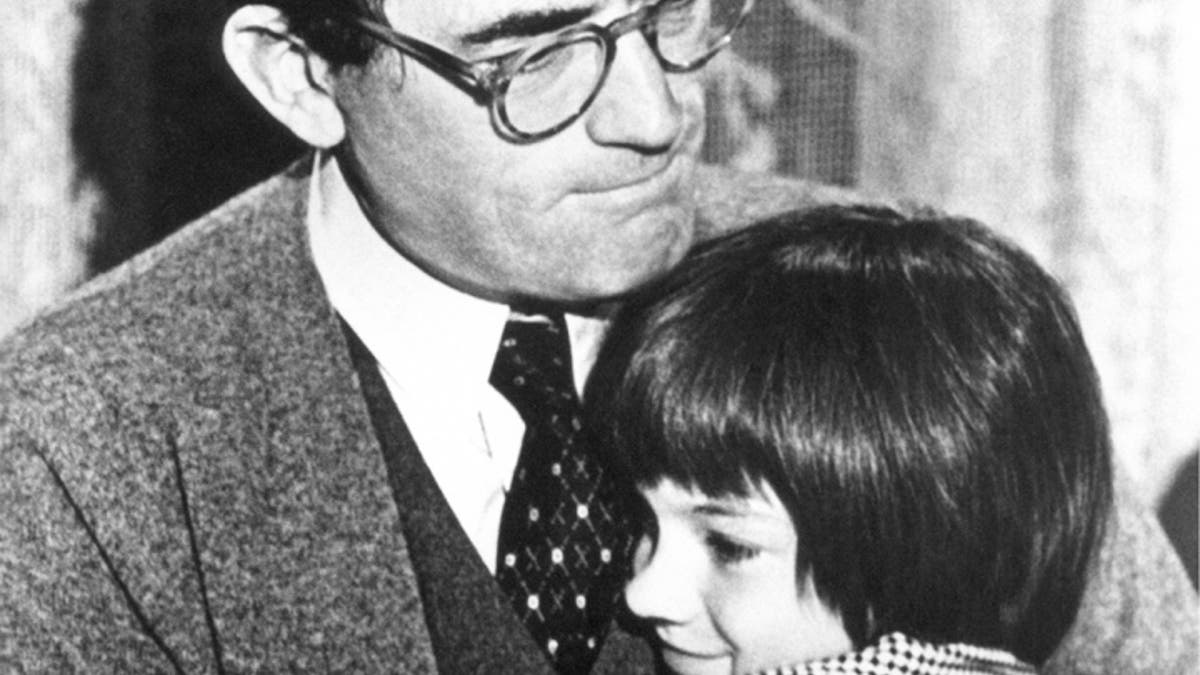
Gregory Peck embraces Mary Badham, 9, who plays his daughter in the 1963 movie "To Kill a Mockingbird."
I was nine when I fell in love with Jean Louise Finch — Scout to her friends. It was her decency I cherished more than anything else, more than how she loved to fight and climb trees, more than the way she called her daddy by his proper name. Scout was good. She was brave and smart and possessed a heart for the very sort of common folk to which I belonged, all of which created in me an affection that could only end in heartbreak.
Though age had not yet claimed my belief that the world burst with magic, no amount of conjuring could allow Scout Finch to reciprocate my feelings. She herself was the conjure, one that could live and love only in the pages of my favorite book. I would open my worn copy of “To Kill a Mockingbird” and walk with Jean Louise and Jem along Maycomb’s streets, play with them and Dill and share their yearning and horror as they gazed upon the Radley home. It was not the only time I discovered that a work of fiction could alter how I viewed truth, but it was the first. More than anything else, that explains why I loved Scout. She was imagined, but she taught me what was real.
The best books grow up with you. Their words never change but their meanings do, and therein resides a magic age cannot claim. “To Kill a Mockingbird” occupies a permanent place on my nightstand. But it isn’t Jean Louise who captures me in my adulthood, nor her presence that prods me to both be and do better. That task has now fallen to Atticus Finch, her father.
I can trace that change to when my own children were born, those years when I first felt the sheer weight of fatherhood. The idea that my daughter and son would look for guidance from a man still struggling to find his place in the world crippled me. And in all my doubts and loathing stood Atticus, his calm wisdom and moral compass still inspiring me even as his sense of duty in the face of scorn convicted me. As a boy, he seemed unreachable. As a man, he seemed even more so. But I realized this: Scout’s goodness and courage grew not only out of herself, but out of the way Atticus raised her. She may be the heart of “To Kill a Mockingbird,” but Atticus is its soul.
The Atticus of Scout’s youth may remain unreachable to me, but I hear the Atticus of Scout’s adulthood may be a man I well recognize — flawed and broken, but kind and trying.
If you’ve been anywhere near a television or the Internet, you’ve no doubt heard that the saga of the Finches doesn’t end with the death of Tom Robinson and the appearance of Boo Radley. The release of “Go Set a Watchman,” an earlier book that Harper Lee grew into “To Kill a Mockingbird,” promises to be the literary event of the year. It will also be the most controversial.
Centered upon a grown-up Scout who returns to Maycomb in the shadow of Brown v. Board of Education, the story depicts Atticus as a man gripped by the very racial prejudice he deplored in the dog-eared and brittle-paged book that helped raise me. The book community blew its collective gasket. Readers vowed to stay away and risk no harm to one of their most honored fictional heroes.
As a novelist, I see “Go Set a Watchman” perhaps as it truly is: a literary artifact and a vein of gold to be mined, something akin to an early draft of a story that would one day belong to our national conscience. By that count, I see nothing wrong with a flawed Atticus Finch. Few characters are right from the start, just as the story authors sit to write is often very different than the story that is written. Again: magic.
But as a father and a human being, I can say I welcome Atticus Finch in whatever sorry moral state he arrives. I do. The Atticus of Scout’s youth may remain unreachable to me, but I hear the Atticus of Scout’s adulthood may be a man I well recognize — flawed and broken, but kind and trying. Would any of us in our most honest moments call such a person a stranger, or would we instead find the courage to call that person ourselves?
In the end, that may be Harper Lee’s final gift. To show us how we are all Atticus Finch, caught between the people we are and the people we should become.
